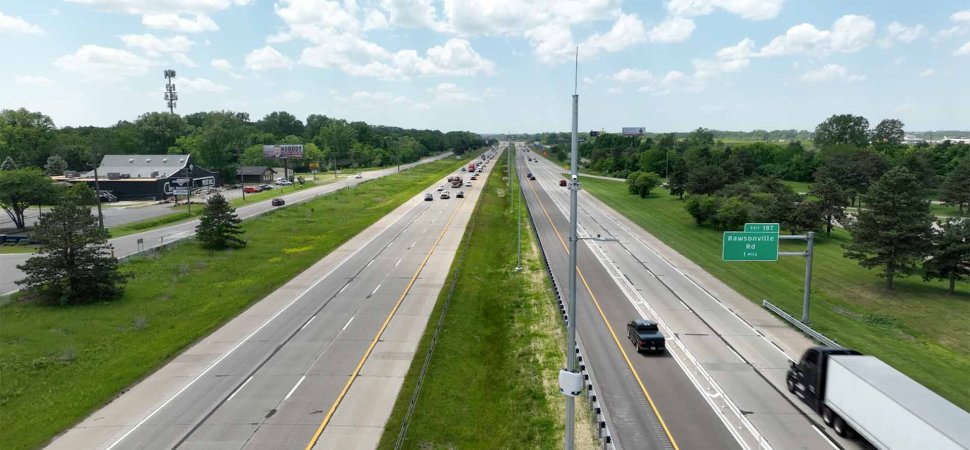
HOW THIS SMART ROAD COULD USHER IN THE FUTURE OF AUTONOMOUS VEHICLES
The three-mile Connected and Automated Vehicle Corridor is bringing advanced transportation technology to Michigan's I-94 highway.
Smart cars, meet the smart road.
Mobility technology company Cavnue announced the completion Tuesday of the first three miles of the 39-mile Connected and Automated Vehicle Corridor linking Detroit with Ann Arbor in southeast Michigan. The three-mile stretch of highway is a pilot program that deploys the latest in technology roadside to build a real-time digital model of road conditions that may help improve safety today and help power autonomous vehicles tomorrow.
"We need smart roadways to provide a much more enhanced safety vision for the country, but what the company was really built to do was future-proof these roadways for this wave of [smart and autonomous vehicles]," says Cavnue CEO and co-founder Tyler Duvall.
Spaced out every 200 meters (or 219 yards) on the three-mile stretch of I-94 near Rawsonville Road are poles containing cameras, radar units, other sensors, wireless communications technology, and even a small computer that provide "enhanced awareness and visibility into what's happening out there on the road," Duvall says. Cavnue pairs that with a software platform that recreates what Duvall calls a "digital twin" of the roadway, and collects data to drive real-time insight into possible safety issues like stalled vehicles, fire or debris on the road, deteriorating pavement, jaywalking pedestrians, and more.
Duvall says Cavnue has also performed numerous civil improvements on the road, including installing state-of-the-art guardrails, lighting the road optimally, and applying a friction treatment to improve safety when weather turns wet--as it often does during Michigan's grueling winters.
"There's just not enough technology out there on the roadway to provide observations around risks and then the insights to deal with them. It's not enough to see what's going on, you have to provide judgment and insights to government and operators and roadways to make interventions," Duvall says.
Cutting down on incident response time and amping up the safety of U.S. roadways may be the most immediate payoffs from smart roads, but the long-term goal of the CAV Corridor is all about autonomy.
"As we compete to lead the future of advanced automotive manufacturing, our infrastructure must keep up too. Today's new corridor will help us achieve our goals with lanes designed to test and deploy connected and autonomous vehicles. Let's keep working together to secure our position as the auto capital of the world by keeping our foot on the accelerator to pursue new ideas," Michigan governor Gretchen Whitmer said in a statement.
The future of smart and autonomous vehicles may be closer than you think. Level 1 and level 2 autonomous vehicles are already driving on U.S. roads, according to the National Highway Traffic Safety Administration. Both levels require drivers to both drive and monitor the roads while driving, but vehicles with level 1 autonomy contain features like adaptive cruise control or lane assistance, whereas vehicles with level 2 autonomy provide assistance with tasks like acceleration, braking, and steering. Tesla's Full Self-Driving and GM's Super Cruise, for example, fall into the level 2 category, according to Kelley Blue Book. Level 3 cars drive themselves under certain conditions so long as the driver is available to take over, but are only available in certain states. Level 4 and 5 vehicles do not require people to operate. Although the NHTSA says these vehicles are not yet commercially available in the U.S., they are under development.
"The industry got out talking about driverless cars and everyone's like, 'Well, where are the driverless cars?' The truth is all these big manufacturers, including in Michigan, are putting this technology increasingly on their vehicles," Duvall says.
The goal is for these types of smart vehicles to benefit from the data Cavnue is gathering on Michigan's roads by communicating with the company's software system. But since there isn't an established industry standard for smart vehicles to communicate with Cavnue's software, as well as with one another, Duvall says the platform is "agnostic."
According to Duvall, Cavnue sees its road-based technology as much safer if not essential for autonomous vehicles to operate.
"We think it is substantially safer and more efficient and more reliable to have a roadway network that works in partnership with these advanced vehicles," he says.
Cavnue was incubated and launched by infrastructure technology company Sidewalk Infrastructure Partners (SIP) in 2020. The startup has raised $130 million to date from investors including Ford and SIP. The company is working to build another pilot stretch of smart highway near Austin focused on autonomous trucking.
This post originally appeared at inc.com.
Click here to subscribe to the Inc. newsletter: inc.com/newsletters"
2024-07-03T12:41:49Z dg43tfdfdgfd